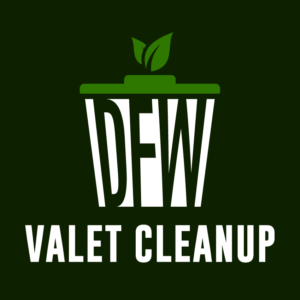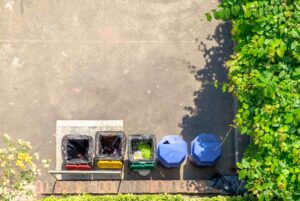Are your residents disposing of waste correctly? Many apartment communities struggle with residents unknowingly tossing recyclables into the trash or contaminating recycling bins with non-recyclable materials. This simple mistake leads to higher waste management costs, increased landfill waste, and potential city violations.
Proper waste separation isn’t just about being environmentally responsible—it impacts community cleanliness, compliance, and overall waste efficiency. When trash and recycling are mixed incorrectly, it can lead to overflowing dumpsters, pest problems, and added expenses for property managers.
In this blog, we’ll break down what belongs in the trash vs. the recycling bin, the most common mistakes residents make, and how property managers can implement better waste separation practices for a cleaner, more sustainable community.
Trash vs. Recycling: What Goes Where?
One of the biggest challenges in waste management is ensuring that residents properly separate trash from recyclables. While some items are clearly disposable, others often create confusion, leading to contamination in recycling bins or unnecessary waste in landfills. Understanding the key differences between trash and recyclables is the first step toward more efficient waste disposal.
The Key Differences Between Trash and Recyclables
Recyclables: Items that can be processed and reused to create new materials. These include:
- Plastics: Bottles, containers, jugs (with recycling symbols #1–#5)
- Paper: Newspapers, magazines, cardboard, and office paper
- Glass: Bottles and jars (rinsed and unbroken)
- Metals: Aluminum cans, tin cans, and clean foil
Trash: Items that cannot be recycled due to contamination, material type, or processing limitations. These include:
- Plastic bags (should be taken to designated drop-off locations)
- Food waste (unless composting is available)
- Styrofoam (difficult to recycle in most areas)
- Dirty or greasy containers (e.g., pizza boxes with oil stains)
Common Items Residents Mistakenly Throw in the Wrong Bin
Many well-intentioned residents unknowingly recycle non-recyclable materials or toss recyclable items in the trash. Some of the most common mistakes include:
- Plastic bags in the recycling bin – Most curbside recycling programs don’t process plastic bags, and they can clog sorting machines. Instead, these should be dropped off at designated recycling centers.
- Pizza boxes in recycling – While cardboard is recyclable, greasy or food-stained boxes belong in the trash because food residue contaminates the recycling process.
- Glass that isn’t food-grade – Mirrors, light bulbs, and ceramics are not recyclable in most programs and should be disposed of properly as trash.
- Takeout containers with food residue – Even recyclable plastics must be rinsed clean before disposal. Otherwise, they can contaminate entire batches of recyclables.
Property managers can reduce contamination, lower waste costs, and improve community sustainability by educating residents on what goes where.
The Most Common Resident Mistakes in Waste Disposal
Even with clear guidelines, many residents unknowingly dispose of waste incorrectly, leading to contamination, increased landfill waste, and additional costs for property managers.
Below are people’s most frequent mistakes when throwing away trash and recyclables—and why they matter.
1. Mixing Recyclables with Regular Trash
Many residents toss recyclables into regular trash bins out of habit or lack awareness. This leads to:
- More waste is heading to landfills instead of being reused.
- Increased costs for waste management services.
- Missed opportunities for sustainable waste reduction.
Solution: Clearly label bins and educate residents on what can and cannot be recycled. Implement valet trash services that include dedicated recycling collection to simplify the process.
2. Improper Disposal of Hazardous or Electronic Waste
Hazardous materials and electronic waste (e-waste) require special disposal methods, but many residents still toss these items in regular trash or recycling bins.
Common hazardous waste mistakes:
- Batteries, light bulbs, and chemicals are being thrown in dumpsters.
- Old paint cans, motor oil, and cleaning supplies leak into waste streams.
Common e-waste mistakes:
- Residents discard old electronics (laptops, phones, TVs) with regular trash.
- Improper disposal of appliances containing harmful materials.
Solution: Offer designated e-waste collection days or provide information on nearby drop-off locations. Enforce clear hazardous waste disposal policies to prevent safety hazards and regulatory fines.
3. Contaminating Recycling Bins with Food Waste
One of the biggest issues in apartment waste management is the contamination of recyclables with food waste and grease. Even one greasy pizza box or unrinsed plastic container can ruin an entire batch of recyclables, making them unrecyclable.
Common contamination mistakes:
- Tossing food-soiled items like pizza boxes and takeout containers into recycling bins.
- Leaving liquids inside plastic or glass bottles.
- Mixing compostable food scraps with regular trash.
Solution: Encourage proper rinsing of recyclables before disposal and educate residents on what materials can actually be recycled. Adding separate compost bins can also help manage food waste responsibly.
By addressing these common waste disposal mistakes, property managers can reduce waste management costs, improve sustainability efforts, and create a cleaner, more organized community.
How Improper Waste Disposal Affects Your Community
When residents don’t follow proper waste disposal practices, the consequences go far beyond a messy trash area.
Improper waste management impacts an apartment community’s appearance, safety, and financial stability, creating unnecessary challenges for property managers.
1. Overflowing Bins and Higher Waste Management Costs
When trash is not disposed of correctly, dumpsters and bins fill up faster than scheduled pickups can handle, leading to overflow. This results in:
- Increased waste removal costs – More frequent waste hauls cost property managers extra.
- Unsightly common areas – Overflowing bins reduce curb appeal and create an unpleasant environment.
- Frustrated residents – Tenants don’t want to live in a community where waste piles up.
Prevention Tip: A structured valet trash service ensures timely pickups, preventing excessive waste buildup and controlling disposal costs.
2. Increased Pest Problems and Health Hazards
Unmanaged waste attracts pests, bacteria, and mold, turning your property into a breeding ground for infestations and potential health risks.
- Rodents & Insects – Trash left out too long becomes an open invitation for pests, leading to costly extermination efforts.
- Bacteria & Mold Growth – Decomposing waste produces harmful bacteria that can spread illnesses.
- Unpleasant Odors – Foul smells linger in hallways and common areas, lowering resident satisfaction.
Prevention Tip: Enforcing better waste separation and scheduled trash pickups prevents health hazards and pest infestations before they start.
3. Violations of City Regulations Lead to Potential Fines
Many cities have strict waste disposal and recycling regulations, and failure to comply can result in costly fines for property managers and HOAs.
- Improper waste sorting – Some cities impose fines if recyclable materials are in regular trash bins.
- Overfilled dumpsters & illegal dumping – Communities that consistently overflow trash areas may face regulatory penalties.
- Environmental non-compliance – Failing to properly dispose of hazardous waste (electronics, batteries, chemicals) can lead to serious legal consequences.
Prevention Tip: Educating residents and partnering with a waste management provider that understands local regulations can help avoid fines and maintain compliance.
By addressing waste management issues proactively, property managers can create a cleaner, healthier, and more cost-efficient community.
How Property Managers Can Enforce Better Waste Separation
Encouraging residents to dispose of waste correctly requires more than just providing trash bins—it requires clear communication, convenience, and ongoing education. Property managers are key in enforcing better waste separation, ensuring compliance, and maintaining a clean and well-organized community.
1. Providing Clear Signage and Guidelines for Residents
Confusion about what belongs in trash vs. recycling bins is one of the main reasons for improper disposal. Clear, visible signage at waste collection areas can reduce mistakes and contamination drastically.
- Use color-coded bins – Assign different colors for trash, recycling, and compost.
- Post simple visual guides – Display lists and images of accepted recyclables near bins.
- Label individual apartment bins – Provide small in-unit bins with clear recycling instructions.
Well-informed residents are far more likely to dispose of waste correctly, reducing sorting issues and waste buildup.
2. Implementing Valet Trash Services with Designated Recycling Collection
One of the most effective ways to enforce proper waste separation is by offering a valet trash service that includes designated recycling collection. This removes the burden from residents while ensuring waste is disposed of correctly.
How valet trash improves waste separation:
- Collectors ensure recyclables and trash are kept separate during pickups.
- Waste is picked up on schedule, preventing overfilled bins.
- Residents follow a structured disposal routine, reducing improper waste disposal.
With valet trash, property managers don’t have to rely on residents alone to maintain waste separation—it becomes part of a managed system that ensures compliance.
3. Educating Tenants Through Newsletters, Digital Reminders, and Community Events
Education is key to long-term waste management success. Proactively educate residents about proper waste disposal instead of waiting for problems to arise.
- Newsletters & Digital Reminders – Send monthly updates about recycling guidelines, pickup schedules, and waste policies.
- Text or Email Alerts – Remind residents of collection days and any waste disposal changes.
- Community Events – Host “Recycling Awareness” days or interactive sessions where residents can learn waste separation best practices.
By integrating education into regular communication, property managers can build a culture of responsibility, leading to better compliance and fewer waste-related complaints.
With clear waste guidelines, structured valet trash services, and ongoing resident education, property managers can effectively enforce better waste separation and keep their communities clean.
Tired of Waste Management Challenges? Let Us Handle It!
Ensuring proper waste separation and disposal doesn’t have to be a struggle. Property managers can eliminate common waste issues, reduce costs, and maintain a cleaner community with the right guidelines, structured valet trash services, and resident education.
At DFW Valet Cleanups, we take the stress out of waste management by offering reliable valet trash services with an established recycling collection. Our streamlined approach ensures that your property stays compliant, clean, and complaint-free—without adding extra work for your team.
Contact Us Today!
Let us handle your community’s waste so you can focus on what matters most—your residents.
Call us at +1 (469) 554-9023
Email us at contact@dfwvaletcleanup.com
DFW Valet Cleanups – Your Trusted Partner in Waste Management!











